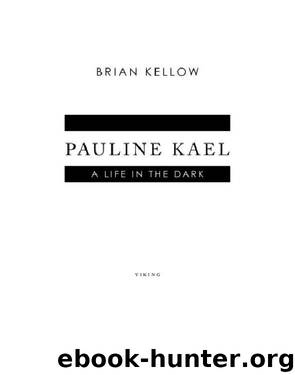Pauline Kael by Brian Kellow

Author:Brian Kellow
Language: eng
Format: mobi, epub
ISBN: 9781101545324
Publisher: Penguin Group USA, Inc.
Published: 2011-09-21T10:00:00+00:00
Robert Altman’s next film was a riff on the film noir genre, based very loosely on a novel by one of the masters of the detective story, Raymond Chandler. The Long Goodbye took Chandler’s private-eye hero, Philip Marlowe, and transported him to early ’70s Los Angeles. According to Altman, his idea was to make the story “Rip Van Marlowe”—the detective essentially wakes up thirty years later with his own code of ethics intact, but finds that everything around him has changed. The plot—Marlowe is implicated in a crime when he does an old friend a favor by driving him to Tijuana, and the friend’s wife turns up murdered—was negligible in terms of how it unfolded. What mattered most, as was always the case with Altman’s films, was the atmosphere and the people. Altman, along with his scenarist, Leigh Brackett (who had coscripted Howard Hawks’s Marlowe classic The Big Sleep), created a stunningly atmospheric portrait of modern L.A., with its lacquered blondes, blocked alcoholic writers, and assorted drifters, loonies, and movie industry wannabes and hangers-on. Most detective films turn on details that are so precisely controlled that the audience may not feel it has time to breathe, but The Long Goodbye was exhilarating in its looseness. Altman was aided immeasurably by the superb camerawork of Vilmos Zsigmond, who used his film-flashing technique to make the movie look like old postcards of L.A.; he also kept the camera moving continually, giving the audience a quiet, sustained sensation of being on a voyage of discovery.
The Long Goodbye was another project to appeal to Pauline’s white-knight impulse: Its L.A. opening in March 1973 was met with stinging reviews and grossed only $10,300 in the opening week. A misleading advertising campaign that made it look like a sleek detective thriller didn’t help. It was pulled from distribution and given a new campaign much closer to the ironic spirit of the film. Only then did it open in New York, and while it was too late for it to become the blockbuster it might have been, at least it turned out to be a hit in Manhattan, where it got mostly favorable reviews and enjoyed a good run.
For Pauline, The Long Goodbye was another Altman masterpiece, and she was beginning to despair of his ever finding a mass audience again. “Maybe the reason some people have difficulty getting into Altman’s wavelength is that he’s just about incapable of overdramatizing,” she wrote. “He’s not a pusher.” In a judgment that sounded suspiciously auteurist, she praised Altman’s contribution at the expense of Leigh Brackett’s, saying that although Brackett’s name was on the picture as scenarist, “when you hear the improvised dialogue you can’t take this credit literally.” Elliott Gould, for whom The Long Goodbye represented a return to stature after two years in the box-office wilderness, felt that the comment about Brackett was not quite fair. “But I understand Pauline,” Gould said. “When we showed the picture at the empty Grauman’s Chinese Theater before it opened, I was there and Leigh was there.
Download
This site does not store any files on its server. We only index and link to content provided by other sites. Please contact the content providers to delete copyright contents if any and email us, we'll remove relevant links or contents immediately.
The Kite Runner by Khaled Hosseini(5179)
Gerald's Game by Stephen King(4654)
Dialogue by Robert McKee(4404)
The Perils of Being Moderately Famous by Soha Ali Khan(4220)
The 101 Dalmatians by Dodie Smith(3511)
Story: Substance, Structure, Style and the Principles of Screenwriting by Robert McKee(3469)
The Pixar Touch by David A. Price(3439)
Confessions of a Video Vixen by Karrine Steffans(3309)
How Music Works by David Byrne(3270)
Harry Potter 4 - Harry Potter and The Goblet of Fire by J.K.Rowling(3073)
Fantastic Beasts: The Crimes of Grindelwald by J. K. Rowling(3058)
Slugfest by Reed Tucker(3003)
The Mental Game of Writing: How to Overcome Obstacles, Stay Creative and Productive, and Free Your Mind for Success by James Scott Bell(2908)
4 - Harry Potter and the Goblet of Fire by J.K. Rowling(2703)
Screenplay: The Foundations of Screenwriting by Syd Field(2642)
The Complete H. P. Lovecraft Reader by H.P. Lovecraft(2563)
Scandals of Classic Hollywood: Sex, Deviance, and Drama from the Golden Age of American Cinema by Anne Helen Petersen(2524)
Wildflower by Drew Barrymore(2489)
Robin by Dave Itzkoff(2441)
